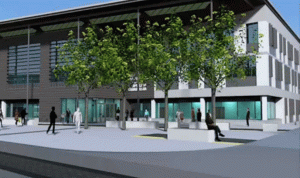
© Christine Rooney-Browne
Instead of talking about the presentations, the hot topic at the start of the IFLA conference seemed to be the WIFI access at the conference centre. Many were discussing the fact that they would have to pay €10 for 4 hours WIFI access. The alternative was to either queue for 10 minutes complimentary access in the hallway, or at the library bus just outside of the conference centre.
And so began the confused and somewhat bemused updates on Twitter, with a number of #fail tweets from disgruntled tweeps and bloggers who had expected the WIFI to be free; it seems to be free at most of the other conferences we’ve all attended recently…
Some dismissed the issue, stating that we were there to listen and learn from the presenters and to network in real life, rather than to check our e-mail. I think they were missing the point a bit.
There are various reasons why one would expect and rely upon free access at an international library conference; and these reasons extend well beyond being able to check our e-mail! For example, during sessions it can be beneficial to be able to check out the speaker’s online biography; or to look up a specific library website; or even to bookmark some of the resources that the speaker has highlighted on their slides to our Del.icio.us accounts…
Also, I know that I am incredibly lucky to be able to attend this conference and I’m well aware that there are many more library and information professionals back home in Scotland who would have loved the chance to attend, but are unable to because of financial constraints, lack of time, etc… Many of these people follow my updates on Twitter; some specifically to be kept informed about news and ideas filtering through from the sessions I attend. A fellow IFLA blogger referred to this as citizen journalism. And I guess it is… 🙂
In addition, as a few of the sessions I wanted to attend were on at the same time, it would have been beneficial to be able to conduct a quick search using the IFLA hashtag on Twitter (#ifla2009 or #ifla09) to see updates from other delegates tweeting from these sessions…
So, on the second day I succumbed and purchased the €10 card…thinking that if I only logged on occasionally I could make my 4 hours stretch the duration of the conference. However, on Wednesday came the announcement that WIFI would be free for the remainder of the conference – yay! The power of Twitter, again? 🙂
Surely, at an international conference where we all come together to discuss hot topics in librarianship and the information society, such as; freedom of information; democratic access to the world’s knowledge; the future of library service provision etc… delegates should be provided with free and democratic access to the internet?! Plinius, a fellow blogger referred to access to online resources at this year’s conference as IFLA1.5, rather than 2.0 😀
Apparently, free WIFI at future IFLA conferences will be discussed in more depth at a later stage. Word on the street is that it’s a budget issue…but I hope that at IFLA 2010 in Gothenburg the issue will be resolved and that all delegates are given a username and password as part of their IFLA welcome packs!
Read Full Post »
 Lately I’ve been hearing a lot about the essential role that public libraries are playing in the regeneration of Scotland’s communities. An example of this is happening right now in Craigmillar
Lately I’ve been hearing a lot about the essential role that public libraries are playing in the regeneration of Scotland’s communities. An example of this is happening right now in Craigmillar






 I covered this a bit
I covered this a bit 


